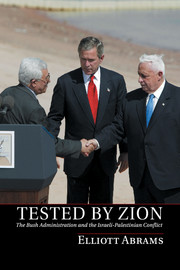Book contents
- Frontmatter
- Contents
- Acknowledgments
- Introduction
- 1 Early Days
- 2 9/11 and the Search for a Policy
- 3 Roadmap to Disengagement
- 4 “New Realities on the Ground”
- 5 Arafat, Disengagement, Sharon
- 6 Olmert – Peace or War?
- 7 War in Lebanon – and Condi
- 8 From Mecca to Annapolis
- 9 The “Meeting” at Annapolis
- 10 Two Trips to Jerusalem
- 11 Final Days in Gaza and Turtle Bay
- 12 Lessons Learned
- 13 Conclusion
- Index
- References
5 - Arafat, Disengagement, Sharon
Published online by Cambridge University Press: 05 January 2013
- Frontmatter
- Contents
- Acknowledgments
- Introduction
- 1 Early Days
- 2 9/11 and the Search for a Policy
- 3 Roadmap to Disengagement
- 4 “New Realities on the Ground”
- 5 Arafat, Disengagement, Sharon
- 6 Olmert – Peace or War?
- 7 War in Lebanon – and Condi
- 8 From Mecca to Annapolis
- 9 The “Meeting” at Annapolis
- 10 Two Trips to Jerusalem
- 11 Final Days in Gaza and Turtle Bay
- 12 Lessons Learned
- 13 Conclusion
- Index
- References
Summary
Our expectations changed on November 11, when Yasser Arafat died in a military hospital in Paris. He was buried in Ramallah after a chaotic funeral, and Mahmoud Abbas was quickly chosen to head the PLO. In accordance with the PA's “Basic Law,” elections were to be held within 60 days for a new president of the Palestinian Authority. If an internal battle had been expected among Palestinians, it did not materialize; it was made clear very soon that Abbas would also be the candidate for president of the PA, replacing Arafat there as well.
Bush's immediate public reaction, one we thought through carefully, was not to shed crocodile tears for Arafat but to look forward. Blair was back at the White House on November 12, the first visit of a foreign leader since the president's reelection, and Bush used their scheduled press appearance to emphasize the positive. “I think it is fair to say that I believe we've got a great chance to establish a Palestinian state,” the president said. “And I intend to use the next four years to spend the capital of the United States on such a state.…We seek a democratic, independent and viable state for the Palestinian people.…We are committed to the security of Israel as a Jewish state.…I look forward to working with the Palestinian leadership that is committed to fighting terror and committed to the cause of democratic reform.” Arafat had been the barrier to real reform, we thought, and his removal from the scene now opened the path forward. No longer would he be there to block the creation of more unified and professional security forces, to steal or divert aid funds (and a global search for the funds would soon be underway), or to prevent democratic institutions from developing. In December, Steve Hadley and I once again visited Jerusalem and found that Sharon shared this view. He told us he would see Abbas right after the Palestinian elections and that he was optimistic: With Arafat gone, he would have someone with whom to talk.
- Type
- Chapter
- Information
- Tested by ZionThe Bush Administration and the Israeli-Palestinian Conflict, pp. 119 - 157Publisher: Cambridge University PressPrint publication year: 2013



